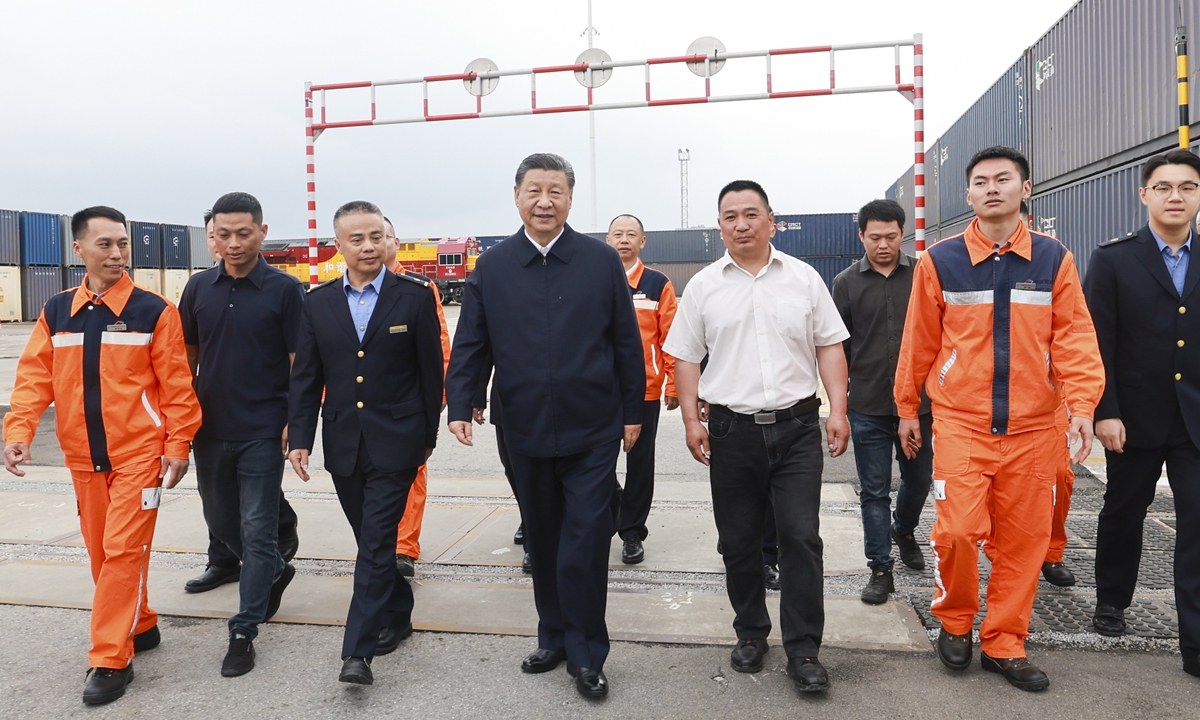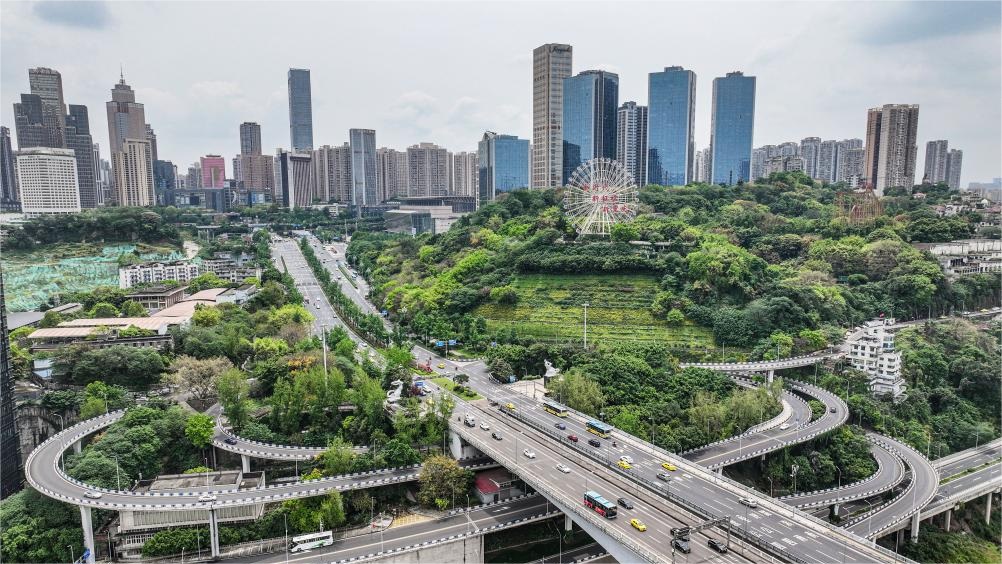Xi calls on Chongqing to promote high-quality development

Chinese President Xi Jinping, also general secretary of the Communist Party of China Central Committee and chairman of the Central Military Commission, visits an international logistics hub park in Southwest China's Chongqing Municipality on April 22, 2024. Photo: Xinhua
Chinese President Xi Jinping stressed further efforts to usher in a new stage in the development of China's western region featuring well-coordinated environmental conservation, greater openness and high-quality development, when he chaired a symposium on boosting the development of China's western region in the new era in Southwest China's Chongqing Municipality.
Xi, also general secretary of the Communist Party of China Central Committee and chairman of the Central Military Commission, made an inspection tour in Chongqing from Monday to Wednesday. During the visit, he called on Chongqing to further deepen reform and opening up across the board and write its own chapter in advancing Chinese modernization.
The remarks and the inspection tour highlighted the great importance the top leader attaches to the development of the western region, which covers more than 70 percent of China's land area and is home to nearly 30 percent of the country's population. The region plays a critical role in China's pursuit of high-quality development and Chinese modernization, and holds great potential in various areas, economists said on Wednesday.
During the symposium on Tuesday, Xi said China's western region has seen significant achievements in eco-environmental conservation and restoration over the past five years, but the region's development is still facing difficulties and challenges, according to the Xinhua News Agency.
The Chinese President said developing industries that leverage local strengths should be the main focus, adding that efforts are needed to adopt a region-specific approach in developing emerging industries and expedite industrial transformation and upgrade in the western region.
Underscoring the importance attached to greater openness, during the inspection tour of Chongqing, Xi also visited an international logistics hub park to learn about the municipality's efforts in accelerating the development of the New International Land-Sea Trade Corridor in west China, according to Xinhua.
China's western region covers Chongqing, six provinces and five autonomous regions, including Southwest China's Sichuan and Northwest China's Xinjiang Uygur Autonomous Region, accounting for 21.5 percent of China's GDP. Although the region's development has been lagging behind the country's eastern coastal regions, in recent years development has been picking up pace. Between 2019 and 2023, the region's combined GDP expanded from 20.5 trillion yuan ($2.83 trillion) to 26.9 trillion yuan, with an annual average growth rate of 4.9 percent.
"The development in the western region has improved significantly in recent years in terms of infrastructure, industrial upgrade and people's livelihoods," Hu Qimu, deputy secretary-general of the digital-real economies integration Forum 50, told the Global Times on Wednesday.
In terms of industrial development, the western region has also seen rapid development in recent years. The region is home to nine national level strategic emerging industry clusters in areas such as new materials and biomedicine, and five national level advanced manufacturing clusters such as electronic information and aviation. The region's industrial added value has jumped from 5.8 trillion yuan in 2019 to 8.1 trillion yuan in 2023, according to official data.
Critical role, vast potential
The symposium on Tuesday further highlighted the western region's critical role in China's efforts to bolster both security and development, as well as its enormous potential in areas such as advanced manufacturing and high-level opening-up, economists said.
"The region is tasked not only to boost local industrial development with many industries shift from the east to the west and provide support in resources and other areas, but also to play a bigger role in the country's opening-up efforts," Dong Shaopeng, a senior research fellow at the Chongyang Institute for Financial Studies at Renmin University of China, told the Global Times on Wednesday.
Dong noted that there is still great room for the western region to expand opening-up by bolstering connectivity with countries and regions through land transport corridors.
The western region has developed multiple trade routes with countries and regions in Europe, Central Asia and Southeast Asia in recent years. The New International Land-Sea Trade Corridor, which connects China's western region with Southeast Asian countries, can reach 490 ports in 120 countries and regions as of January 2024, with cargo volume jumping 21 percent year-on-year in 2023, according to official data.
Moreover, the western region also plays a crucial role in the China-Europe Freight Train Express. Over the past five years, 35,000 China-Europe freight trains have been launched in the western region, accounting for 50.5 percent of the national total. Thanks to the greater connectivity, the total import and export volume of the western region reached 3.7 trillion yuan in 2023, an increase of 37 percent from 2019.
Greater connectivity and openness of the western region is of great importance to the country's efforts to expand high-level opening-up and bolster both security and development, economists said.
"Although the capacity of land transport remains relatively low, it has a very high level of security compared to sea transport," Hu said, noting that land transport corridors in the western region can better cope with geopolitical tensions and offer a steady channel for transport of strategic resources under extreme circumstances.
Apart from its great importance in China's long-term security and development, the western region is also crucial in the country's efforts to tackle downward pressure and consolidate the economic recovery in the short term by boosting domestic investment and consumption, economists said.
"Whether it is from the perspective of responding to international situation, or overall coordination of development and security, or the current need to stabilize growth, it is imperative to boost the development of the western region," Hu said, pointing to the huge potential in infrastructure investment and consumption in the region.
As the region's economic development accelerated in recent years, infrastructure construction and consumption have also been expanding steadily. For example, in the first quarter of 2024, Chongqing saw a 4.4-percent growth in fixed-asset investment, with a 16.7-percent growth in industries and 8.5 percent in infrastructure. Retail sales in the municipality also grew by 5.5 percent year-on-year, higher than the national growth rate of 4.7 percent, according to official data.
Photos
Related Stories
- Xi Story: An avid reader and his dictionary
- Xi: Bolster growth of western region
- Xi sends congratulatory letter to forum on space cooperation with LatAm, Caribbean countries
- Xi chairs symposium on boosting development of China's western region in new era
- Xi calls on Chongqing to write its chapter in Chinese modernization
- People's wellbeing is of utmost importance in Chinese modernization: Xi
Copyright © 2024 People's Daily Online. All Rights Reserved.









